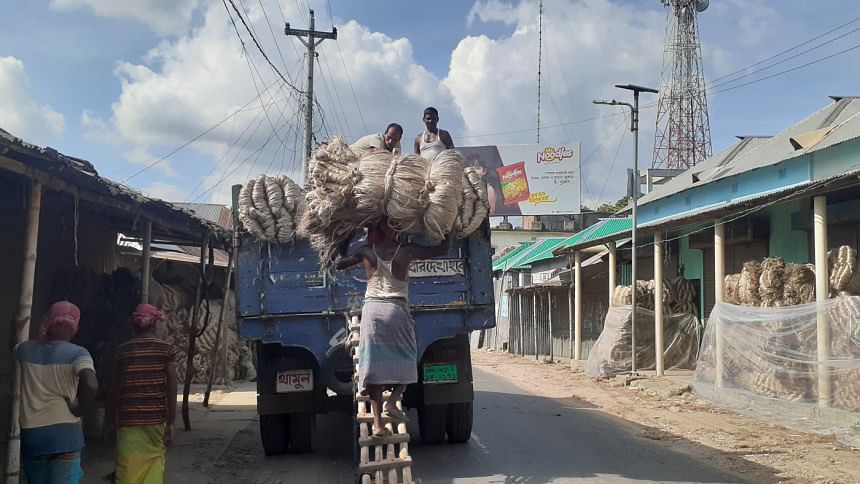Jute prices continue to fall

Jute growers in Bangladesh are facing deepening woes as prices of the natural fibre have been in a downward slide amid a consistent decline in exports, according to industry insiders.
Besides, sales in the domestic market are scant at best due to the government's indifference towards enforcing a law making it mandatory to pack certain commodities in jute bags.
As such, the finest quality jute is currently being sold at about Tk 2,600 per maund (37 kilogrammes) while it was Tk 2,700 just one month back, they said.
The price of medium quality jute fell the most, decreasing by about 20 percent year-on-year to Tk 2,100 per maund in absence of adequate demand from mills.
"The situation in the jute market is very dire as farmers are suffering for low prices," said Ganesh Chandra Saha, managing partner of International Jute Traders, a major raw jute exporter.
Saha said the falling global demand for raw jute and jute goods, such as yarn and sacks, is mainly due to the economic slowdown resulting from ongoing conflicts in major markets such as Europe and Africa.
For example, the ongoing Russia-Ukraine war, military coup in Sudan, unrest in Syria and devastating earthquake in Turkey, the main yarn importing country, has caused a slump in demand for jute goods.
Similarly, the demand for raw jute in major markets like India and Pakistan have fallen too.
This is because India, the world's biggest producer of the golden fibre, enjoyed sufficient yields this year while demand in Pakistan has been hampered by the country's economic turmoil, he added.
Export earnings from jute and jute goods have been lodged in a downward spiral since fiscal 2021-22 and the trend has continued this year too.
Receipts from shipments of jute and jute goods dropped nearly 10 percent year-on-year to $222 million in the July-September period of the current fiscal year, as per data of the Export Promotion Bureau.
Increased usage of jute bags in the domestic market could have cushioned farmers from the reduced global demand by helping ensure higher prices and sales at home.
However, domestic usage has not increased sufficiently even though the government framed a law making it mandatory to use jute bags for packaging 19 commodities, including rice and wheat, in 2010.
The law was enacted to protect the interests of jute growers and millers while also limiting the use of the environmentally harmful plastic bags.
"But the law has had no effect on the market," Saha said.
Echoing the same, Md Abul Hossain, chairman of the Bangladesh Jute Mills Association, said the government is "playing ducks and drakes" when it comes to enforcing the law.
"As a result, farmers will switch to other crops if they do not get enough profit from jute," he added.
Abdus Salam, a farmer based in Mominpur village under Rangpur sadar upazila, shared this line of thought, citing how traders are offering him just Tk 2,000 per maund for raw jute.
"At this rate, many growers will shift to more profitable crops like tobacco and vegetables," he said.
Abdur Razzak, a jute farmer in Sundarganj upazila of Gaibandha, said farmers would benefit from cultivating jute if prices of the golden fibre are set between Tk 2,700 and Tk 3,300 per maund.
Farmers in the country's main growing regions -- Rajbari and Faridpur -- are some of the worst affected by the declining prices as they invest a lot of time and money to raise the crop.
Local growers and traders said they sold raw jute for Tk 2,600 to Tk 3,200 per maund in 2023 while the price has tumbled to just Tk 1,600 to Tk 2,600 at present.
Ramjan Ali, a jute farmer from Baliakandi upazila in Rajbari, said he had come to the Baharpur Jute Market to sell eight maunds of the natural fibre.
However, Ali ultimately sold his jute at loss as it was purchased for about Tk 1,700 per maund even though each maund cost roughly Tk 1,770 to produce.
With this backdrop, growers are demanding the government to intervene and ensure reasonable prices.
Contacted, Textiles and Jute Secretary Md Abdur Rauf said they are trying to enforce the law that makes it mandatory to use jute bags for packaging select goods but are facing resistance from various quarters.
He informed of two instances where officials faced backlash when trying to enforce the law.
The first was when a mobile court was attacked by traders in Dinajpur for imposing a penalty on their failure to use jute bags for packaging rice.
The second case was in Dhaka, where the mobile court was forced to return without taking action.
"Also, polythene and plastics bags have flooded the market," Rauf said.
"So, conducting drives will not ensure increased use of jute bags amid the abundance of plastic bags," he added, suggesting that other government agencies should come forward to reduce plastic usage.
Rauf also informed that another reason for their inability to enforce the law is that the Department of Jute lacks the required manpower.

 For all latest news, follow The Daily Star's Google News channel.
For all latest news, follow The Daily Star's Google News channel. 



Comments